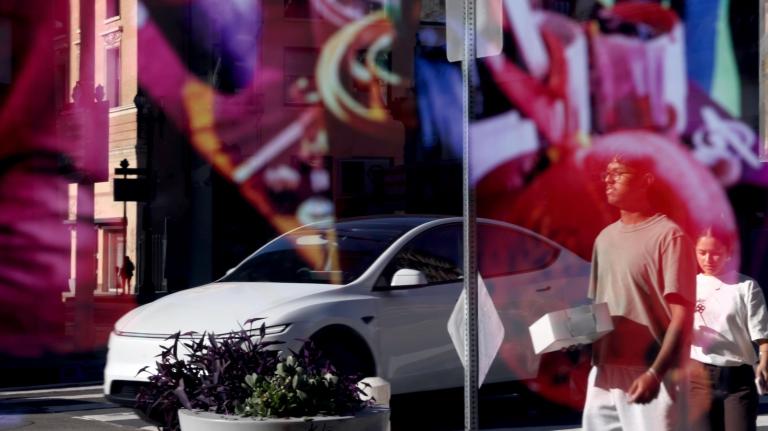 Growing up in Park Slope, Brooklyn, I used the subway to get around the city. Cabs — or car services, since in those days (the 1990s) taxis were often impossible to find in my part of town — were saved for special circumstances: It was very late, it was pouring rain, or your subway line wasn’t running. Only some Uptown kids, with more money than me, seemed to use cabs as their main mode of transportation, the same way suburbanites drive everywhere. They often seemed to have an only passing familiarity with the subway system.
Growing up in Park Slope, Brooklyn, I used the subway to get around the city. Cabs — or car services, since in those days (the 1990s) taxis were often impossible to find in my part of town — were saved for special circumstances: It was very late, it was pouring rain, or your subway line wasn’t running. Only some Uptown kids, with more money than me, seemed to use cabs as their main mode of transportation, the same way suburbanites drive everywhere. They often seemed to have an only passing familiarity with the subway system.
So it was with considerable amusement that I heard that Newt Gingrich inveighed again last Friday against “elites” in Manhattan who live in high rises and “ride the subway.” As every New Yorker knows, the measure of true privilege is being centrally located and flush enough that you never have to depend on the loud, dirty, unreliable mass transit system. If you live in an outer borough, it can be difficult to find a cab, or one that is willing to take you where you want to go. And the cost of cabbing everywhere would be ruinous for all but the very wealthy.
Of course, many people who are objectively rich and arguably elite take the subway in New York. But while Gingrich views this as a sign of moral decrepitude, it is part of what makes the city so great. The kind of elites Gingrich prefers — the sort who live in suburban Atlanta and get into an Escalade every time they leave the house — rarely come into contact with the less fortunate. If you live on Park Avenue, on the other hand, riding the subway is the great equalizer of your life experience. No matter how rich you are, you will suffer the delays and indignities of the subway just like the middle-class and poor riders from the Bronx and Harlem sitting next to you.
Although this doesn’t guarantee with 100 percent certainty that you will develop a more empathetic attitude toward the travails of the less fortunate, it certainly helps. That is presumably one reason that rich New Yorkers are so much more likely to vote for the same candidates as their poor neighbors than are suburbanites of the same means.
And that is what Gingrich finds so offensive about the subway: It breeds liberalism.
As far as he is concerned, universal means of transportation are no doubt just the beginning of a slippery slope toward universal health insurance. The fact that pooling our collective transportation budgets in the form of a subway system makes traveling vastly cheaper for individuals and society as a whole — much like, say, Canada’s national health insurance — is of little interest to demagogues who want to keep society divided along racial and cultural lines.
Republican leaders in the House of Representatives apparently feel the same way. Rep. John Mica (R-Fla.), who chairs the Transportation and Infrastructure Committee, recently introduced a proposal for the long overdue reauthorization of the Surface Transportation law. Much like Gingrich’s nonsensical comments, it is driven (pun intended) by suburban identity politics rather than rational policy analysis. It would, as Greg Hanscom writes, “cut all designated funding for bike and pedestrian infrastructure, the Safe Routes to School program, and grants that have encouraged ‘complete streets’ projects.” In addition, House Speaker John Boehner “proposed killing a longstanding rule that sets aside a portion of the gas tax to fund trains and buses and other public transportation systems.”
A cynic might say that Gingrich, who has based his campaign largely on an appeal to the racial and cultural resentments of older white suburbanites, knows perfectly well that elites are not the only people riding the subway. In South Carolina last month, he invoked “elites in New York and Washington,” who “live in high-rise apartment buildings writing for fancy newspapers in the middle of town after they ride the metro,” he may have been also playing to the fearful image of blacks and Latinos that “New York” and “subway” conjures in the minds of his supporters.
His imagery is outdated, if not a little offensive. Back in the 1990s, when Gingrich was last relevant, “media elites” who resided in New York City were concentrated in Manhattan. In recent years they’ve become more dispersed into the outer-boroughs. Today, Manhattan is home to a good number of hedge fund managers, whose effective tax rate Gingrich wants to cut to zero by eliminating the capital gains tax.
Next time Gingrich wants to raise the specter of liberal intellectuals he might want to name-check the outer-borough neighborhoods of Fort Greene or Astoria. But if he wants to call out the real elitists, he should look at his supporters who live in detached houses in segregated suburbs and drive everywhere, instead of making nonsensical jabs at the people riding the subway.




